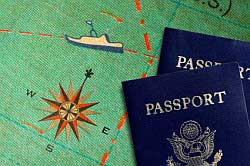When considering work abroad or on a cruise ship it is always necessary to keep in mind the laws regarding citizenship and hire. For the most part, if someone wants to gain employment in a foreign country they need to acquire work visas and permits. What’s worse is waiting for the paper work to come through and paying the fees to process them; a process which is notorious for taking weeks, if not months to complete. The cruise industry however, is a glorious loophole in the nightmare of work visas and permits. Because cruise lines sail to ports all over the world they aren’t restricted to the citizenship and work laws of any specific country and thus, are free to hire employees from all over the world. In fact, it is very common for the staff onboard a large ocean liner to be incredibly diverse with people from many different countries and backgrounds. One ocean liner reported having a staff comprised of people from 25 different countries around the world. For many, this diversity is another perk to working onboard a ship. Aside from the excellent pay, employees get a chance to see the world and forge relationships with people from many different places, building unique friendships and adding to the diverseness that is working onboard a cruise ship.
While in most work environments the largest factor for employers might be the  laws and regulations regarding the people they can hire, on a cruise ship it is usually language. Because the clientele of a cruise ship is so heavily North American most employers demand their employees have strong command of the English language. For some positions, like those that require staff to interact with guests on a regular basis, this is a must. For other positions, like cleaning staff or laundry workers, speaking English is less of a concern. Of course for smaller cruise lines that sail around a specific country or region, the language demands might be different however, for the most part, cruise line Concessionaire companies and cruise line employers ask that their staff speak English.
laws and regulations regarding the people they can hire, on a cruise ship it is usually language. Because the clientele of a cruise ship is so heavily North American most employers demand their employees have strong command of the English language. For some positions, like those that require staff to interact with guests on a regular basis, this is a must. For other positions, like cleaning staff or laundry workers, speaking English is less of a concern. Of course for smaller cruise lines that sail around a specific country or region, the language demands might be different however, for the most part, cruise line Concessionaire companies and cruise line employers ask that their staff speak English.
For cruise lines that operate mainly in US waters, like those sailing to Alaska and Hawaii for instance, they are required to abide by the strict citizenship rules and regulations of the states. This is because they operate mainly in US waters and ports and thus, must abide by US law. When looking for cruise ship employment, consider the cruise line you are applying the citizenship laws they must follow.
For people in search of cruise ship careers there are many venues to consider. Aside from Concessionaire companies and applying to cruise ships directly, those looking for employment can take advantage of the thousands of International Staffing Agencies in countries all over the world. This is a great place for someone who wants to gain employment on a US or European Cruise line but is currently living abroad. For college students, taking advantage of job fairs and auditions that take place in cities all over the country is another excellent venue for employment opportunity and a great way to learn about the cruise ship job market.
The cruise ship industry is in many ways bringing people together. Employees from all over the world are congregating onboard these large ships and travelers from around the globe are able to see places they might otherwise never have seen, all because of the cruise ship industry. It truly is making the world a smaller and more accessible place to thousands, while offering incredible job opportunities to people all over the world.

